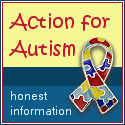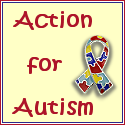I've been asked to write about autism and work.
Maybe this should be a series of posts to go through the whole process of preparing for employment, finding a job, getting it and keeping it.
ASD in this post means: autism spectrum disorder.
Young people who want to prepare themselves for the future, or who want to earn money looking no further than the first pay check and the things they'll buy, just apply for a vacationjob at a supermarket or another place where they have simple jobs available for young people.
They learn from trial and error, listen well to the instructions and ask others when it's not clear what's expected from them.
People with ASD often won't be accepted when they apply for a vacationjob, or they are not ready even to want one.
Because they lack peer contact they won't hear from others about vacancies.
So, with the same age, they lack job experience, which put them often behind their peers.
The present knowledge about ASD provides enough to develop a way to guide people with ASD to a job that fits their abilities, and is challenging enough without discouraging the person.
Here we use a special system to enable people with ASD to get and keep a job.
step 1. Know yourself
Most important is to write down and learn about the good and less good characteristics of the person, regardless of a job.
This will provide a lot of insight in skills that are present and those which need to be learned.
Many people with ASD have troubles planning, keeping a good day and night rhythm, being somewhere in time, estimating time needed for a task, formulating questions, etc etc.
step 1a: improve yourself
Based upon this list of good characteristics and skills and weaknesses, a learning program can be made. Taking about 3 items at a time, during about 3 months.
Most of these tasks can be practiced as part of a normal day program with school, or daily activities.
step 2: Finding out what you want to do.
When it's known what kind of job the young person is interested in, information can be gathered. Realistic ideas about the job requirements can be created,
These requirements can be listed beside the good/weaknesses analysis, showing areas where further education is needed.
Step 2a: train yourself
Many people with ASD need to consciously learn appropriate behaviour as individual elements, need to synthesize them into a chain of behaviours, and they need special training to generalize learned behaviour to other settings.
For some jobs special practice settings are created at a school or as a daycare facility.
Take for instance administration, duties at a reception, and keeping track of stock in a shop.
This can be practiced in a kind of office at school.
Working at a restaurant can be practiced in a real restaurant setting where visitors know they're visiting a restaurant where young people are taught at the job.
Often this requires one tutor to one or two young people.
The tasks, set out in step two are taken into the program at the practice setting.
A boy who always arrives late will be trained to be in time both at home and at work.
To be continued.
July 9 I'll land well before breakfast in London.
Of course I can do with a welcoming committee. LOL!
The return journey isn't booked yet and depends partly on when I'm able to see some of my English friends, how much I have to spend, if we 2 (son of 23 and I) can find an affordable place to stay after the weekend and on how many speaking opportunities are offered.
You can contact me to speak about autism through the contact button at the top of the blog.
Because I've also had quite a lot of success with round table meetings and meetings where I answer questions people have about autism, I also want to offer my presence there.
Round table meetings can either be used to exchange experiences between parents, for instance, or to discuss matters about one person or case with all the people involved in the care for the person: doctors, school, parents.
Because I have 4 autistic children between the age of 16 and 23, and 2 non-autistic children, and their father is autistic too, I have a wide array of experiences to share.
I'm a psychologist, discovered autism in all my children long before their first birthday and even before their vaccinations.
I'm OK with all subjects. And I'm quite willing to travel outside London. (That's why we didn't book a place to stay after the weekend.)
So contact me and we'll work things out.
Michael Buckholtz has been on hunger strike for 30 days to raise funds for his non-profit organisation and to raise awareness.
I've blogged about him before on this site.
At this place I want to thank all bloggers who took displayed the graphics on their site or EC-bought the awareness graphic on their widget.
I also want to thank my fellow twitterers and tweeties, who tried to spread the message.
Getting the media interested in a genuine human being is far more difficult nowadays than it was about ten years ago.
But his message is strung, his humor is powerful, so I won't be amazed that he'll find his way into the hearts of many people.
The local paper of Macon publicized an article about Michael and made a video which you'll find at the right top of their page.
Thank you Michael for all you do for people with autism and for autism families who are struggling with the financial burden of autism.
Let's keep on spreading the word!!!





